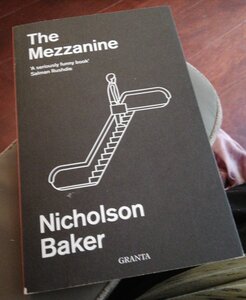Nicholson Baker’s debut novel was first published in 1988. It’s set during an office worker’s lunch hour, and consists of his lengthy thoughts on the minutiae of life, such as why both his shoelaces snapped in quick succession (were stresses caused by tying the laces, or by the laces rubbing against the eyeholes of his shoes?).
To give you a flavour of the prose, here the protagonist imagines what will happen after he’s bought a rubber address stamp, paid his bills, and taken some chairs for recaning:
Molten rubber was soon to be poured into backward metal letters that spelled my name and address; blind people were making clarinetists’ finger motions over the holes of a half-caned chair, gauging distances and degrees of tautness; somewhere in the Midwest in rooms full of Tandem computers and Codex statistical multiplexers the magnetic record of certain debts in my name was being overwritten with a new magnetic record that corresponded to a figure diminished to the penny by the amount that I had a written out in hasty felt-tip pen on my checks…
The technology fixes Baker’s novel in time to an extent, but in an intriguing way. The protagonist is fixated on the workings of mechanical systems, and of course this is a time when office work is full of them, right down to the frequent use of staplers. There is a real sense of the character interacting with his environment, because what he’s thinking is inevitably tied to the physicality of things.
I’ve been trying to decide whether The Mezzanine is poking fun at its protagonist’s obsessions, and I’m still not sure. Sometimes it all seems over the top, such as when the character is deciding on the most politic spot to sign his name on a get-well card (not too close to the boss’s name!). Sometimes I just think, this guy is enthusiastic and interested, so good for him.
Maybe it’s there in the book’s title. The character’s office is on the mezzanine, so when he travels up the escalator, his destination is only part-way up and no further. Looked at another way, he’s found his level, and seems happy with it. Whichever, I’m glad I spent time in his world.
Published in Granta Editions.

Recent Comments